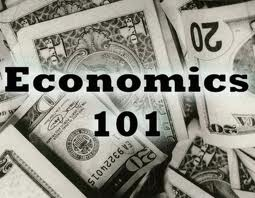 Although I don’t generally post long quotations from other sources here, in this case I’m going to make an exception. In fact, I’m going to post an entire page. It’s just that good.
Although I don’t generally post long quotations from other sources here, in this case I’m going to make an exception. In fact, I’m going to post an entire page. It’s just that good.
Not only is it top-notch information, it’s timely too. As you read it, compare its wisdom to the message coming from our nation’s capital these days. Big difference. Given the consequences, I’d say there’s not only an important difference, but a frightening one as well. Barack Obama certainly doesn’t get it (unless his ultimate goal is to bring down and remake the American economy into a socialist model). I don’t think that John Boehner and his merry band of big-government Republicans get it, either. Otherwise they would refuse to cooperate with President Obama’s agenda altogether.
Be sure to read the entire thing (it’s short). Reflect a few moments. Then read it again. I suspect it will leave you shaking your head. It’s page 139 of Henry Hazlitt’s fine little volume entitled Economics in One Lesson: The Shortest and Surest Way to Understand Basic Economics (Three Rivers Press edition, 1979). It’s still available if you’d like to purchase a copy for yourself. I highly recommend it; it was written for folks like you and me, folks who aren’t economists but who wish to understand the topic.
Hazlitt was an economist, but also a philosopher and a journalist. He wrote for several influential publications, including the New York Times, the Wall Street Journal, and Newsweek. He was greatly influenced by economist Ludwig von Mises and the so-called Austrian School of Economics (I have written in this blog before about Mises and the Austrian School). Economics in One Lesson originally appeared in 1946 and it has become a classic economics text. I wish every American would read it, just after they take the time to read the Constitution.
A voice for reason and logic rather than emotionalism and polemics, Hazlitt died in 1993. From the vaults of heaven I bet he’s shaking his head and thinking, “they still don’t get it.” Anyway, here is the extended quotation. I find it inspiring and loaded with common sense. Sadly, common sense isn’t so common in the halls of government. Though it begins with the topic of the minimum wage, it raises broader implications quickly. I have reproduced the page in bold print to make it clear that this is the work of Hazlitt and not my own.
As you read Hazlitt’s words, you may come to the conclusion that our federal government is doing the exact opposite of what it should be doing to assist our citizens in securing their economic recovery. It’s as if Hazlitt were still alive, writing for today.
“All this is not to argue that there is no way of raising wages. It is merely to point out that the apparently easy method of raising them by government fiat is the wrong way and the worst way.
This is perhaps as good a place as any to point out that what distinguishes many reformers from those who cannot accept their proposals is not their greater philanthropy, but their greater impatience. The question is not whether we wish to see everybody as well off as possible. Among men of good will such an aim can be taken for granted. The real question concerns the proper means of achieving it. And in trying to answer this we must never lose sight of a few elementary truisms. We cannot distribute more wealth than is created. We cannot in the long run pay labor as a whole more than it produces.
The best way to raise wages, therefore, is to raise marginal labor productivity. This can be done by many methods: by an increase in capital accumulation–i.e., by an increase in the machines with which the workers are aided; by new inventions and improvement; by more efficient management on the part of employers; by more industriousness and efficiency on the part of workers; by better education and training. The more the individual worker produces, the more he increases the wealth of the whole community. The more he produces, the more his services are worth to consumers, and hence to employers. And the more he is worth to employers, the more he will be paid. Real wages come out of production, not out of government decrees.
So government policy should be directed, not to imposing more burdensome requirements on employers, but to following policies that encourage profits, that encourage employers to expand, to invest in newer and better machines to increase the productivity of workers–in brief, to encourage capital accumulation, instead of discouraging it–and to increase both employment and wage rates.”
(Henry Hazzlit, Economics in One Lesson: The Shortest and Surest Way to Understand Basic Economics. (New York: Three Rivers Press 1979)

Hazlitt’s perspective is different from that of Catholic social teaching. When he says that “the more [the worker] is worth to employers, the more he will be paid,” Hazlitt is placing all his marbles in market forces. He leaves no room for the possibility that the employers might keep the extra profit for themselves. He sees no need for regulation of the market to protect workers from greedy employers. CST does see such a need.
Jerry, I want to highly recommend to you the works of Dr. Thomas E. Woods Jr. Dr. Woods is a devout Catholic who has authored an excellent book “The Church and the Market: A Catholic Defense of the Free Economy.” It will put to rest many of your fears, and I highly recommend it!
Also, just google “Thomas Woods + Catholic Social Teaching” and anything by Woods will give you a unique insight from a free-market perspective. (Of course, Googleing this will lead you to some of Dr. Woods’ detractors as well.)
John, I just wanted to share with you an interesting story about Hazlitt and unions. Hazlitt’s uncle’s business went under totally because of unionization. As a result, Hazlitt hated unions as a boy, and took a very rough, anti-union line for much of his young life.
Then, after being around Ludwig von Mises and Murray Rothbard for many years, Hazlitt came to believe (as I do) that unions are–in and of themselves–good. They only become evil when the state gets involved in forcing firms to accept unionization. Thus, Hazlitt changed his mind on union matters and (I think) would have supported heroic Union men like Samuel Gompers, who not only did not use the State to force unionization during his chairmanship of the AFL but refused it when offered on several occasions.
John, I’d like to offer this interesting biographical essay on Hazlitt here:
http://mises.org/page/1453/Biography-of-Henry-Hazlitt-18941993
And for more fascinating bits on Hazlitt the man, read Jeffery Tucker’s excellent biography:
http://books.google.com/books/about/Henry_Hazlitt.html?id=Y9m6AAAAIAAJ
Jerry, your warning is well taken. But I have to disagree. For instance, I’m currently reading Chapter 20 of the Hazlitt text, on unions. Hazlitt is very pro-union. He extols their virtues in putting pressure on stubborn employers. But he goes one step further and then also trains his critical eye on the abuses that unions often perpetrate in the name of justice or fairness. Quite often, they aren’t interested in fairness at all, but in pumping up the economic value of workers beyond what is reasonable. Why else would they react so (often) violently in their protests and in their response to those who cross picket lines to work?
As for Catholic social teaching, I recognize much good there. But it has its limitations. As bishops often make theological judgments that are less than stellar when pronouncing against theologians, I find they also sometimes make poor economic judgments as well.
Thanks for reading and for commenting. You are always welcome here, as are your criticisms!